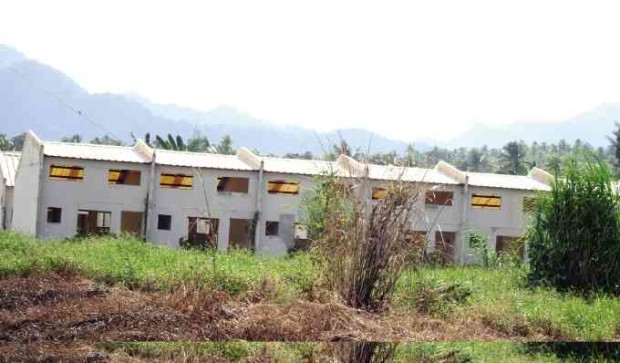Houses empty in ‘good news’ village

ROWS of empty houses, meant for policemen and soldiers, sit on land in a village called Sangyaw, a Waray word that means “spread the good news.”VICKY ARNAIZ
Sangyaw Village in Tacloban City’s Barangay Tagpuro derives its name from the Waray word which means “spread the good news.”
But the conditions of 800 housing units built there, supposedly for policemen and soldiers, are hardly positive. The units were completed in 2013, yet these have remained empty and rotting.
The supposed beneficiaries have not moved in from lack of electricity because the project has not been given an occupancy permit. A pump has been installed, but no water flows into the units.
The Sangyaw houses are part of an P18.6-billion housing program launched by the administration of then President Benigno Aquino III in 2012 for members of the Philippine National Police and the Armed Forces of the Philippines. These sit on an eight-hectare land in Tagpuro, eight kilometers from the city center and five km from the famous San Juanico Bridge, which connects Samar and Leyte islands.
The project has 1,000 beneficiaries—450 from the AFP, 450 from the PNP, 50 from the Bureau of Fire Protection, and 50 from the Bureau of Corrections (BuCor).
At least P240 million had been spent on the village, which is supposed to also have a two-classroom building and a multipurpose hall. Each unit cost at least P245,000, but it will be sold to beneficiaries for only P215,000, with the remaining amount subsidized by the PNP or AFP.
‘Yolanda’ tragedy
Groundbreaking rites for Sangyaw were held in April 2013, but construction activities were suspended after Supertyphoon “Yolanda” (international name: “Haiyan”) struck heaviest in Tacloban on Nov. 8 that year. The 150 units standing then survived the catastrophe, with only three damaged.
Joseph Peter Sison of Solana Corp., one of the construction companies that built the village, said the units were designed to withstand winds of up to 220 km per hour.
While government gave priority to aid for storm survivors, only four policemen moved in. Doing so proved to be a risk for them and their families as the units had no occupancy permit, a violation of building laws, said Dorcas T. Secreto, National Housing Authority (NHA) regional estate management specialist.
While it is clear that the lack of permit has been the main reason nearly all Sangyaw units are empty, it is actually as complicated as the red tape attributed to it.
The land was bought from its original owners by the NHA, but transferring the title to the housing agency took about a year. The next step would have been to break down the mother title to individual titles bearing the names of beneficiaries as new owners, but doing so takes time—a lot of it.
As the processing of individual titles was left hanging in the air, the developers—Solana and Golden Build Corp.—cannot turn over the project to the NHA, even after 800 of the units had long been completed. Secreto said the developers had already received partial payment from the NHA central office in Quezon City.
Processing problems
The problem lies on the government’s failure to process individual titles toward the issuance of occupancy permits. Under the project contract, the developers are responsible for the transfer of titles and the issuance of occupancy permits.
Secreto said the NHA’s role was just to “facilitate or make follow-ups.”
Neither the developers nor NHA had applied for occupancy permits, which would allow authorities to check the units for structural integrity, said city engineer Dony de Paz.
Sison said only 800 of the units had been finished as the developer was awaiting instruction to continue building the houses as originally designed or follow a new design. It all depends on the new administration of President Duterte, he said.
If it took a year to transfer the title of the land to the NHA, Sison said it could take longer to issue individual titles to beneficiaries.
Taking time
Solana has already started the process of acquiring individual titles, but it “takes our time and I hope the new administration can do something about it.”
During a recent visit to Sangyaw, Sison talked to the Housing Board of the PNP, AFP and BuCor that awarded the units to its personnel. He said he had given the green light for Solana to help beneficiaries acquire occupancy permits while processing their titles.
“It is best that beneficiaries occupy the (units) so that these can be taken care of while we process the title,” Sison said. The developers are ready to install doors and window jalousies if a beneficiary is ready to move in to a unit, he added.
One of the beneficiaries, SPO4 Antonio Salas of the Tacloban police, wants the PNP to help him acquire an occupancy permit for his unit, which needs to be cleaned up and repaired after years of neglect.
Paying for a unit in Sangyaw is “a lot better than paying rent in an apartment in the city that eats up much of my take home pay,” Salas said.
A security guard, who refused to be identified, said many beneficiaries were willing to move in but could not because the absence of an occupancy permit also means no electricity.
Widows of soldiers and policemen killed in action have taken a close look at the units, but they, too, have refused to occupy the dwellings.
Another reason Sangyaw Village looks like a ghost town is that the PNP and AFP cannot agree on which units are for policemen and which are for soldiers.
RELATED STORIES
Homes for cops, soldiers like birdhouses, says lawmaker
9,200 protest ‘irregularities’ in Yolanda housing aid














